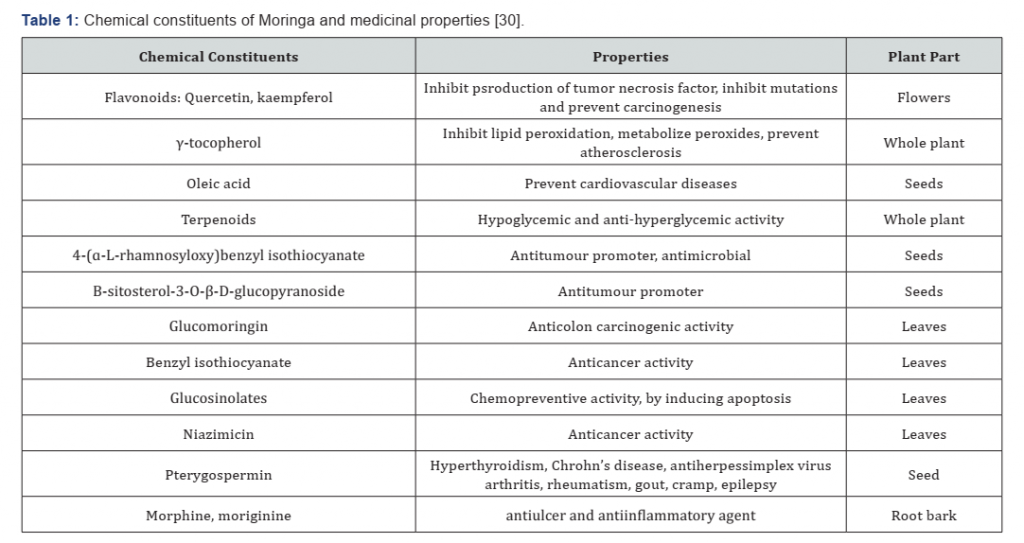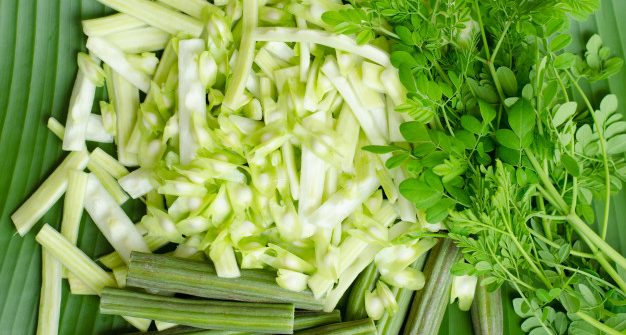Phytotherapaeutic Functionality of Moringa Oleifera Lam for Health
Moringa oleifera Lam (Moringaceae) is grown in many countries of the tropics and subtropics. Moringa is an edible plant and from ancient times our ancestors have been using it as a regular component of conventional eatables in India. It is commercially grown in India, Africa, Mexico, Hawaii, South and Central America and throughout Asia. Different parts of this plant such as leaves, bark, roots, seeds, flowers, fruits and sap have various medicinal uses and high nutritional value.
Moringa has very important medicinal value. It possesses antibacterial, antifungal, antioxidant, antidiabetic, diuretic, antitumor, anti inflammatory and antipyretic activity. It also possesses hepato protective, antiulcer, antihypertensive and cholesterol lowering activities. Various compounds such as polyphenols, flavonoids, alkaloids, phenolic acids and glucosinolates possess tissue protective, antiulcer, immune modulatory and analgesic activities. The bioactive compounds that have been isolated from M. oleifera seeds, stems, leaves and flowers include glucosinolates, flavonoids, chlorogenic acid, phenolic acid, kaempferol, moringinine, rhamnoglucoside, rutin, myricetin, glycosides niaziminin and niazinin. Dried Moringa has very important medicinal value. It possesses antibacterial, antifungal, antioxidant, antidiabetic, diuretic, antitumor, antiinflammatory and antipyretic activity. It also possesses hepatoprotective, antiulcer, antihypertensive and cholesterol lowering activities. The plant can be best grown in dry sandy or loamy soil that is slightly alkaline. It is adaptable to various soil conditions like varying pH but it cannot tolerate water logging, freezing or frosts conditions. It belongs to the Moringaceae family of perennial angiosperm. Moringa is a small native tree of the sub-Himalayan regions of North West India, which is now indigenous to many regions in Islands and South America. This esteemed tree was claimed to be ‘the most nutrient rich plant yet discovered’ by.
Nutritional Composition
The nutritional composition of this plant plays an essential role in nutritional, medicinal and therapeutic properties. It has essential nutrients such as omega 3 and omega 6 fatty acids. The leaves and pods of Moringa contains high amount of Calcium, Magnesium, Potassium, Mangnese, Phosphorus, Zinc, Sodium, Copper, and Iron. Moringa has been found to contain a group of unique compounds which are uncommon sugar-modified glucosinolates. These compounds show certain chemo preventive activity, by inducing apoptosis. Latest research shows that agro ecological zonation had no significant effect on the levels of most nutrients in Moringa leaves.

Phytotherapaeutic Functionality of Moringa Oleifera Lam for Health
Medicinal properties of Moringa
Anti-inflammatory activity
Various studies on Moringa plant have been shown to possess antiinflammatory activity. The anti-inflammatory activity of the methanol leaf extract of Moringa was exhibited using carrageenan and histamine-induced tests. Root extract of Moringa expressed antiinflammatory activity in carrageen an induced rat paw oedema. Alcohol extract of the seeds of Moringa exhibited antiinflammatory activity in guinea pigs.
Antiasthmatic activity
The kernels of Moringa seed demonstrated potential effect in the treatment of bronchial asthma (Table 1). The patients showed markedly improved relief in the severity of asthma symptoms as well as in respiratory functions.
Antioxidant activity
Moringa has high antioxidant potential. The antioxidant activity of Moringa tree leaves have been reported due to its high amount of polyphenols. Aqueous extracts of leaf, fruit and seed of Moringa showed antioxidant activity. Methanol and ethanol extracts of Indian origin Moringa exhibited highest antioxidant activity of 65.1% and 66.8%, respectively in a study carried out on freeze dried Moringa leaves. Quercetin and Kaempferol showed good antioxidant activity on hepatocyte growth factor induced Met cell migration. The meat exhibited highest efficiency in terms of radical scavenging activity when supplemented with Moringa leaves.
Antipyretic activity
A study was conducted on antipyretic effect of ethanol, petroleum ether, solvent ether and ethyl acetate extracts of Moringa seeds by yeast induced hyperpyrexia method in rats; where ethanol and ethyl acetate extracts of seeds exhibited significantly high antipyretic activity.
Cardio protective, antihypertensive and cholesterol lowering activities
Alkaloid ‘moringinine’ in Moringa root bark stimulated cardiac function through its effect on sympathetic nervous system. Moringa prevented hyper lipidemia due to iron deficiency in male wister rat. Nitrile, mustard oil glycosides and thiocarbamate glycosides present in Moringa leaves showed blood pressure lowering effect.
Anticancer activity
Moringa has been shown to possess potential therapeutic activity to fight cancer. Niazimicin is a bioactive compound found in Moringa leaves, exhibited anticancer activity. Moringa leaf extract showed potential cytotoxic effects on human multiple myeloma cell lines. A study conducted by showed that Moringa pod could be an effective chemo preventive agent.
Antimicrobial activity of moringa
The extracts of different morphological part of moringa tree, such as seeds’ cotyledon, seeds’ coat, stem bark, leaves, and root bark have been shown to exhibit antimicrobial activity. Its leaves ethanolic extracts has also been reported to inhibit Indian earthworm Pheritima posthuma, reported antimicrobial activity of aquous extracts of pods’ husks against gram negative pathogenic bacteria and yeast strains.
Antifibrotic/ ulcer effect
Moringa seed extract has been found to contain antifibrotic effects on liver fibrosis in rats.
Diuretic andantiurolithiatic activity
The parts of Moringa such as roots, leaves, flowers and gum exhibit diuretic activity. Antiurolithiatic property from the aqueous and alcoholic extract of the root bark of Moringa was reported.
Antihepatotoxic activity
Various studies have shown hepato protective activity of Moringa. The root and flowers of Moringa possess strong hepato protective activity. A flavonoid named Quercetin has been found in Moringa flowers which may be responsible for its hepato protective activity.
Antidiabetic activity
Moringa leaves are good source of polyphenols which are responsible for hypoglycemic activity. Moringa leaves reduce blood glucose concentration to a significant level in type 2 diabetic rats.
Wound healing properties
The leaf extract of Moringa has been tested for wound healing capacity. Ethyl acetate extracts (10% in form of ointment) have shown significant activity. Phenolic compounds and phytosterols found in these extracts show wound healing activity.
Antiarthritic effect
The methanolic extract of Moringa could be effective in the treatment of rheumatoid arthritis.
Moringa oleifera is having multidimensional properties and have large number of economic applications. Due to easy cultivation and world availability makes it an excellent potential for growth in economy and health & nutrition sector in a developing country like India. It is an inexpensive and good alternative to good nutrition as well as to prevention of a lot of diseases. We need to develop some strategies in order to explore and utilize full benefits of this miracle tree.
Source: http://www.morifa.co.id/wp-content/uploads/2019/08/Phytotherapeutic-Functionality-of-Moringa.pdf
Mehra M, Jakhar N, Joshi S, Meghwal M. Phytotherapaeutic Functionality of Moringa Oleifera Lam for Health. Int J cell Sci & molbiol. 2017; 3(3) : 555612. DOI: 10.19080/IJCSMB.2017.03.555612.
Read more :
- Facial Beauty Moringa Oil
- Moringa Leaf Powder Benefits
- Let’s Fight Corona Virus Using Pure Moringa Oil
- How To Start A Business With Moringa Powder Wholesale
For your inquiry about moringa oil/moringa powder :
Contact us :
E-mail: [email protected]
Phone: +6221-2903 4428
Fax: +6221-2903 4429
Sales Mobile/Whatsapp: +62813 8063 7778
Moringa Indonesia Fangardana is moringa oil company moringa oil wholesale moringa oil bulk supplier moringa oil manufacturer moringa oil producer moringa oil bulk seller moringa oil supplier moringa leaf powder organic moringa leaf powder moringa leaf company moringa leaf manufacturer moringa leaf seller moringa leaf supplier moringa leaf producer moringa leaf indonesia moringa oil indonesia | moringa oleifera moringa oleifera moringa oleifera moringa oleifera

